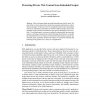Free Online Productivity Tools
i2Speak
i2Symbol
i2OCR
iTex2Img
iWeb2Print
iWeb2Shot
i2Type
iPdf2Split
iPdf2Merge
i2Bopomofo
i2Arabic
i2Style
i2Image
i2PDF
iLatex2Rtf
Sci2ools
168
click to vote
ESORICS
2011
Springer
2011
Springer
Protecting Private Web Content from Embedded Scripts
Many web pages display personal information provided by users. The goal of this work is to protect that content from untrusted scripts that are embedded in host pages. We present a browser modification that provides fine-grained control over what parts of a document are visible to different scripts, and executes untrusted scripts in isolated environments where private information is not accessible. To ease deployment, we present a method for automatically inferring what nodes in a web page contain private content. This paper describes how we modify the Chromium browser to enforce newly defined security policies, presents our automatic policy generation method, and reports on experiments inferring and enforcing privacy policies for a variety of web applications.
Related Content
| Added | 20 Dec 2011 |
| Updated | 20 Dec 2011 |
| Type | Journal |
| Year | 2011 |
| Where | ESORICS |
| Authors | Yuchen Zhou, David Evans |
Comments (0)

